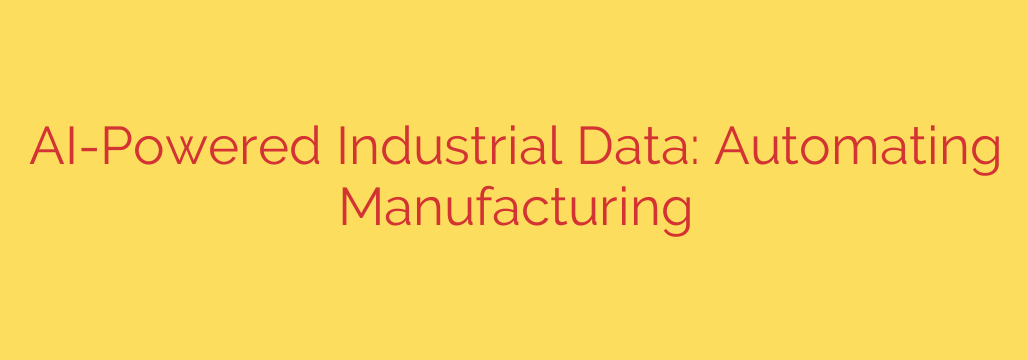
AI in Manufacturing: Transforming Industrial Data into Automated Excellence
The modern manufacturing floor is no longer just a collection of machines; it’s a vast ecosystem generating enormous amounts of data every second. From sensor readings and production metrics to equipment diagnostics, this flood of information holds the key to unprecedented efficiency and innovation. However, harnessing this data has been the primary challenge—until now. Artificial intelligence (AI) is the catalyst transforming raw industrial data into a powerful engine for automation and intelligent decision-making.
By leveraging machine learning algorithms and advanced analytics, manufacturers are moving beyond simple automation to create truly smart factories. This shift, often called Industry 4.0, is about creating interconnected systems that can learn, adapt, and operate with minimal human intervention. Let’s explore the core applications where AI is making the biggest impact.
Predictive Maintenance: Preventing Downtime Before It Happens
One of the most significant costs in manufacturing is unplanned downtime. Traditionally, maintenance was either reactive (fixing something after it breaks) or based on a fixed schedule, which often led to unnecessary servicing or unexpected failures.
AI completely changes this paradigm. By analyzing real-time data from Industrial Internet of Things (IIoT) sensors—monitoring factors like vibration, temperature, and energy consumption—AI algorithms can detect subtle anomalies that signal an impending failure. This allows maintenance teams to schedule repairs proactively, drastically reducing unplanned downtime, cutting maintenance costs, and extending the lifespan of critical equipment. Instead of guessing when a machine needs service, you know with a high degree of certainty.
Automated Quality Control with Computer Vision
Maintaining consistent product quality is paramount. Manual inspection processes are often slow, expensive, and prone to human error, especially in high-volume production lines.
Here, AI-powered computer vision provides a revolutionary solution. High-resolution cameras combined with sophisticated machine learning models can inspect products with superhuman speed and accuracy. These systems can identify microscopic defects, ensure correct assembly, and verify labeling in milliseconds. By automating quality control, manufacturers can achieve near-perfect quality standards, reduce waste and rework, and ensure customer satisfaction.
Optimizing the Supply Chain and Inventory
A resilient and efficient supply chain is the backbone of any manufacturing operation. AI is instrumental in optimizing everything from demand forecasting to inventory management. By analyzing historical sales data, market trends, logistical constraints, and even external factors like weather patterns, AI models can predict future demand with remarkable accuracy.
This data-driven insight allows companies to optimize inventory levels, preventing costly overstock situations and avoiding stockouts that can halt production. AI-driven supply chain management creates a more agile, responsive, and cost-effective operation that can better navigate disruptions and market volatility.
Key Benefits of Integrating AI in Manufacturing
The adoption of AI-powered automation delivers a wide range of tangible benefits that directly impact the bottom line and overall competitiveness:
- Increased Operational Efficiency: AI optimizes production schedules, streamlines workflows, and ensures machinery is running at peak performance, maximizing output.
- Enhanced Product Quality: Automated inspection and process control lead to fewer defects and a more consistent, high-quality end product.
- Reduced Costs: Through predictive maintenance, waste reduction, and optimized energy consumption, AI significantly lowers operational expenditures.
- Improved Workplace Safety: Automating dangerous or repetitive tasks reduces the risk of human injury, while AI can also monitor the work environment for potential hazards.
- Data-Driven Decision-Making: By transforming complex data sets into clear, actionable insights, AI empowers leaders to make strategic decisions with confidence.
Actionable Security Tips for the Smart Factory
As factories become more connected, they also become more vulnerable to cyber threats. Protecting your AI-driven industrial systems is not just an IT issue—it’s a critical operational priority.
- Implement Robust Access Controls: Ensure that only authorized personnel can access or modify control systems and sensitive data. Employ multi-factor authentication wherever possible.
- Segment Your Network: Isolate your critical operational technology (OT) network from your corporate IT network. This prevents a breach in one area from spreading to the other.
- Prioritize Regular Patching and Updates: Keep all software, firmware, and operating systems on your IIoT devices and control systems up to date to protect against known vulnerabilities.
- Conduct Continuous Monitoring: Use AI-powered security tools to monitor network traffic for anomalous behavior that could indicate a cyberattack in progress.
The future of manufacturing is intelligent, connected, and automated. By embracing AI, companies can unlock the full potential of their industrial data, creating smarter, more efficient, and more resilient operations poised to lead the market for years to come.
Source: https://datacenternews.asia/story/ai-industrial-data-drive-manufacturing-towards-autonomy








